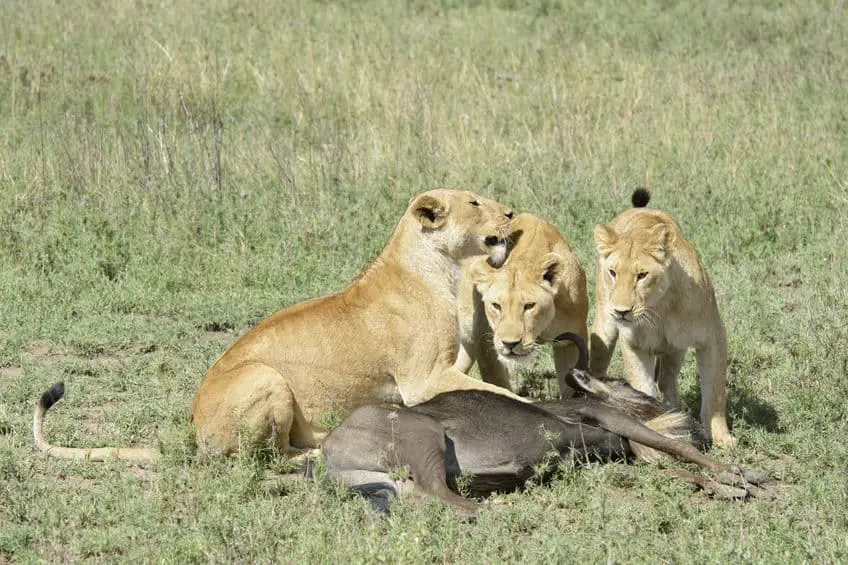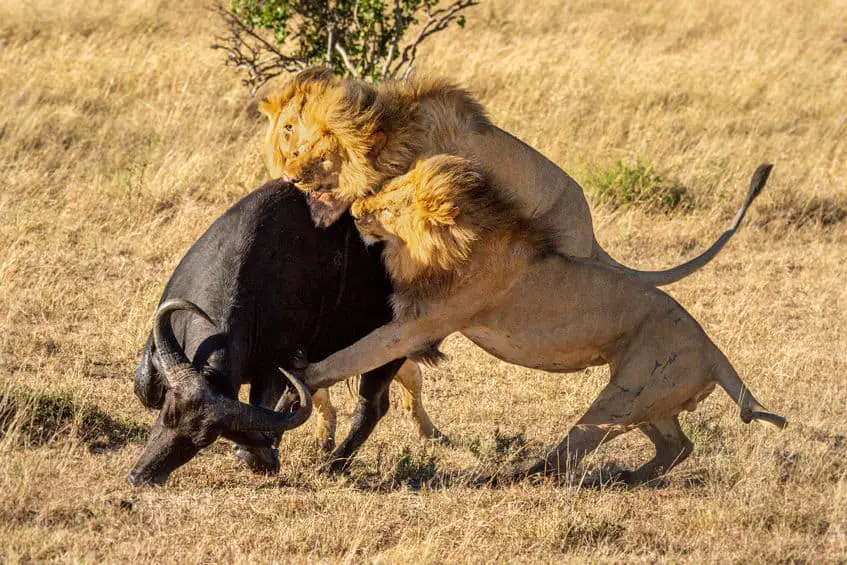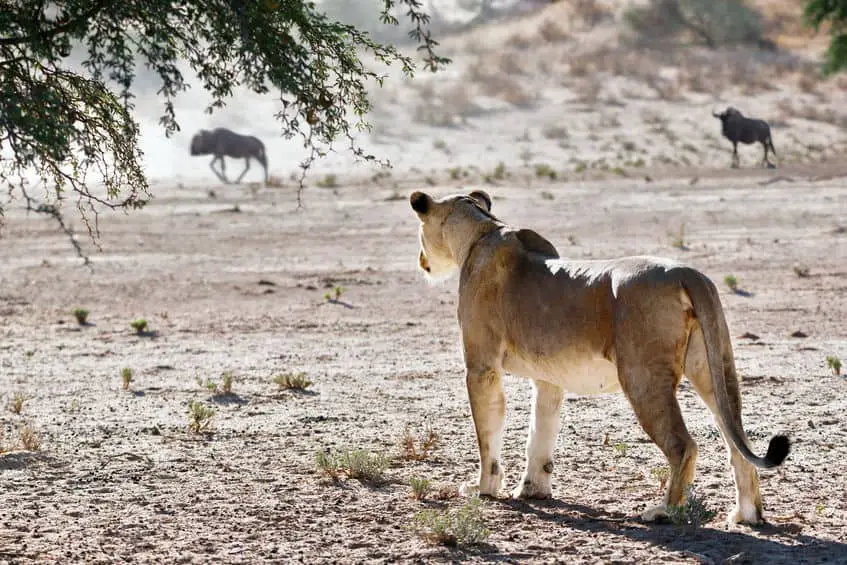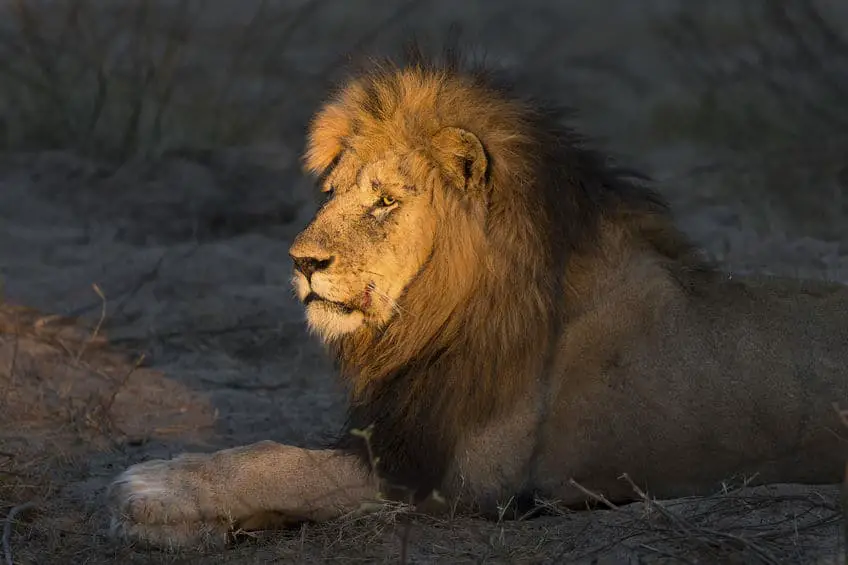
Lions are by far the largest cats in Africa and a proud member of the big five. But what exactly do lions eat to reach such massive sizes? I have written this post to explain exactly that.
Lions are hypercarnivores whose food consists almost exclusively of meat. Their primary food consists of zebra, wildebeest, cape buffalo, and other medium-sized or large hoofed mammals but if necessary, they can eat almost any African animal.
As you can probably imagine, the full answer to what lions eat is a bit more complex so, in the rest of this post, I have given a much more detailed answer to what lions eat.
What Do Lions Prefer to Eat?
Lions are carnivores and their diet consists almost exclusively of meat which they get by either hunting or scavenging.
Lions thrive in areas with a large population of medium-sized and large hoofed mammals that they can hunt and eat but what each lion or pride of lions’ food consists of depends largely on the area they stay in and on what prey animals are available to them in that area. It is quite typical for a lion’s diet to primarily consist of just a handful of different types of animals.
These animals are among lions’ primary target prey and food:
- Zebra
- Wildebeest
- Cape buffalo
- Oryx
- Kudu
- Impala
- Springbok
- Giraffe
- Warthog
- Waterbuck
- Sable antelope
- Other medium-sized to large antelopes and other hoofed mammals.
Since lions often hunt as a group, they can take down prey that is many times larger than themselves, and lions have been seen successfully hunting and taking down very large prey animals such as rhinoceroses, hippos, or even young elephants. These animals are much rarer for lions to prey on than the animals from the list above, however, since their skin is extremely thick which makes it difficult for the lions to kill and eat them.
Like you and me and almost every other animal in the world, lions have some types of food that they prefer over other types of food. The animals I have listed above seem to be the preferred prey animals for lions but the list of what lions eat is long and does not end there. At all actually.
Below I have dug a bit deeper to find out what lions eat when they are faced with conditions that make hunting and catching their favorite prey difficult or even impossible.
What Else Can Lions Eat?
Lions are extremely strong and efficient predators and like so many other predators (and cats especially), they can hunt or scavenge and eat a wide variety of animals so when their favorite prey from the list above is not available to them, they have to look elsewhere.
There can be many reasons why the prey animals from the list above are not available for the lions to eat and the most common reason is that some prides of lions reside in very dry areas or in areas where the selection in prey is just different from those on the list. If lions live in areas with a low concentration of their favorite prey, they will simply hunt and eat pretty much any animal they can find and catch.
Lions who do not have medium-sized or large antelopes and other hoofed animals available for them to hunt will often prey on these animals:
- Mice
- Lizards
- Birds
- Tortoises
- Small critters
- Crested porcupines
- Beetles
- Termites
- Snakes
- Crocodiles
In some dry areas, lions have even adapted to the lack of water by replacing some of their drinking with eating certain types of water-rich fruit such as tsamma melons.
So as you can see, the list of what lions eat is long and depends largely on where the lions stay and what prey animals are available to them.
How Often And How Much Do Lions Eat?

Lions are by far the largest African cat and even the largest African predator on land. The large male lions can weigh upwards of 250 kg (551 lb). The largest lion ever recorded weighed an incredible 272 kg. (600 lb). Since lions are so large, they naturally need to eat a lot. But how much and how often do lions eat? Let’s find out.
Lions prefer to eat every day but this is far from always the case. In fact, on average lions do not get to eat every day and can often go without eating for 4-5 days.
Since lions can sometimes go for several days without eating, they will really dig in when they successfully catch and kill a large prey animal.
Lions can eat an amount of meat equivalent to 20% of their own body weight which for the largest male lions can amount to as much as 50 kg. (110 lb) of meat in a single meal.
When lions get to eat every day, however, they do not need to eat quite as large amounts of meat at the same time. Lions who get to eat every day will usually eat around 5-10 kg. (11-22 lb) of meat per day.
Since most of what lions eat consist of animals that they hunt, how much they eat also depends largely on how well they can hunt. In the rainy season, the vegetation grows much more and is much denser than during the dry season and since lions’ hunting success relies heavily on being able to sneak up on their prey, they are better able to catch prey and thereby get to eat more during the rainy season than during the dry season since they can hide better in denser vegetation.
When And Where Do Lions Eat?
Lions will usually eat in the spot where they caught their prey or found their carrion but when they catch their prey in the water, they will drag it to shore to eat it on the dry land away from uninvited guests such as crocodiles.
Lions are nocturnal animals and are almost only active and hunt at night but they can also sometimes hunt during the day. If a lion catches some prey on a warm and sunny day, they will often drag it towards a large bush or a tree where it can stay in the nice cold shadow.
What Do Lion Cubs Eat?
Alright, so by now we have covered what, how much and how often lions eat but what about their cubs?
For the first six to seven months of their lives, the very young lion cubs drink their mothers’ milk since this is full of nutrients that will help them grow.
When they are around two to three months old, their teeth have begun to grow out and the young cubs will have meat introduced in their diet alongside the milk from their mothers.
At the age of six to seven months, the cubs will stop drinking their mothers’ milk and their diet will look more like that of the older lions, although of course in significantly smaller quantities.
When the cubs are around two years old, they have learned the art of hunting on their own and at this point, they will be able to provide food for themselves.
How Do Lions Hunt?

Before they get to eat, lions have to secure their food and while lions also scavenge (we will get into this in the next section), most of their food comes from hunting prey. So how do lions hunt?
Lions are by far the largest African cat and the largest African predator on land so they can hunt and take down prey much larger than other African predators.
Even though lions are more than capable of hunting and killing prey on their own, they usually prefer to hunt in groups (prides). This combined with their massive size allows them to take down prey much larger than any other African predators are capable of and even prey that is several times larger than the lions themselves.
It is usually the lionesses that take care of the hunting but when necessary, the male lions will come to assist them.
Lions are very large and heavy and they use a lot of energy when they run. For this reason, they can only run fast for a few hundred meters so while their top speed of approximately 80 km/h (50 mph) is quite impressive, they will often have to give up their chase if they have not caught their prey within the first few hundred meters since they get too exhausted to continue otherwise.
Since lions use so much energy when they run, they also rely heavily on their ability to sneak up behind their target and get as close as possible to them before they leap forward and strike to minimize the amount of energy they have to use.
Lions are excellent at working together and have great coordination when hunting as a group. A few lions from the pride will often run ahead and try to lure their target prey into a trap where the rest of the pride will be waiting to surround them from different directions. This level of coordination suggests an impressive intelligence in lions.
The male lions will usually eat first but in some cases when the pride has caught some large prey that contains plenty of meat for the entire pride to feast on, the male lions will happily share. When they catch smaller prey, however, the male lions will generally make sure that they eat until they are full before letting anybody else eat.
Lions Are Also Scavengers

As we have already learned, lions secure most of their food by hunting and catching prey but their hunting success varies a lot depending on several external factors such as the season of the year, the area they are in, and what prey animals are available to them in that area at the moment.
Luckily for the lions, they do not depend solely on their hunting success and a quite significant amount of their food actually comes from scavenging and eating carrion. I have read several sources that stated that some lions get up to as much as 40% of their food from scavenging but this number also depends largely on the external factors I mentioned just above.
Sometimes lions even steal carrion from other predators or other scavengers such as spotted hyenas or African wild dogs.
Lions Don’t Chew Their Food And Can’t Digest Plants
Lions have huge canine teeth that are designed specifically to rip flesh from a carcass rather than for chewing the flesh so lions actually don’t really chew their food. They will mostly just swallow entire pieces of flesh.
Like other cats, lions can digest flesh much easier than they can digest plant material and the reason for this is that the lions’ entire digestion system is built specifically for the digestion of meat and is missing some enzymes that are used for the digestion of plants.
How To See Lions That Are Hunting Or Eating
Since lions are nocturnal predators, you will have the best chances of seeing them when it is dark, so to increase your chances of spotting lions, I highly recommend going on game drives, either in the very early morning, ideally before sunrise, or in the late evening, ideally after sunset. Lions can often still be active and hunt at these hours. You can either go with a professional ranger or guide or just alone in your own car,
Even though lions are nocturnal creatures, they can still be seen during the day if you are lucky.
If you want the best chances of spotting lions during the day, try going on game drives on cold and cloudy days. Lions will generally try to avoid being active on the warmest and most sunny days but on colder and cloudier days, they can sometimes be seen hunting since the heat is not as overwhelming for them on these days.

